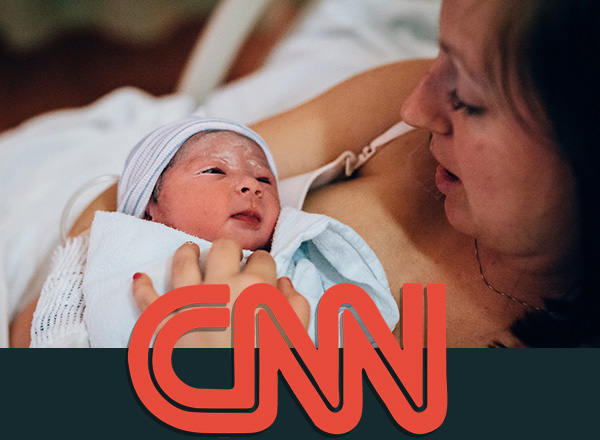In Vitro Fertilisation | IVF in Greece
In vitro fertilization (IVF) is the standard and established assisted reproduction treatment in which an egg retrieved from a woman’s ovaries is fertilised by a man’s sperm in the laboratory to create an embryo. The embryo is then transferred for implantation back into the uterus, aiming for pregnancy.
IVF is the treatment that has offered the opportunity to millions of couples to become parents since 1978. The field of assisted reproduction is constantly evolving; treatments are becoming more effective with consistently higher success rates.
Today, in vitro fertilization in Greece is the most effective fertility treatment we provide, especially when combined with egg donation for older women, with success rates reaching 92%.
Premium Fertility Services since 1996
Selecting the right people to accompany you on the journey to motherhood is an important factor of success in assisted reproduction.
The EmBIO Fertility Center of Athens has been a leading fertility clinic in Europe for almost 30 years.
Having one of the highest success rates in the world, we’ve helped create families and fulfil dreams worldwide with over 30,000 happy, healthy births.

IVF from 1978 until today
Four decades have passed since Louise Brown’s birth in 1978, the first so-called “test-tube baby”, and more than 5 million children have been born due to fertility treatments. These children are all around us—our children, nieces and nephews, and the children of our closest friends.
Assisted reproduction offers hope and solutions for infertile couples, estimated to represent 15% of the adult population. A method that was finger-pointed at by society as a doubted experiment without knowing where it would lead, today, it is a widespread treatment that no longer astonishes anyone.

IVF in Greece
EmBIO IVF Centre in Athens, Greece, has been specialising in fertility treatments since 1996. We are up to date with all the latest developments and have the most cutting-edge technology equipment at our disposal, all of which offer us a significant advantage over smaller centres.
Thanks to the extensive experience, the excellent training at the side of the pioneers in assisted reproduction (Lord Professor Bob Edwards, Sir Robert Winston), and the collaborations with renowned names in gynaecology (Professor Cypros Nikolaidis), EmBIO has been established as one of the leading fertility centres in Europe and offers holistic care that raises success rates to more than 78%.
The latest trend is the use of artificial intelligence in Reproductive Medicine, and EmBIO offers the promising choice of embryo selection with time-lapse and ovarian rejuvenation with PRP.
All 30,000 babies born with infertility treatments since 1996 are truly the greatest award for our highly trained staff.
It is also a pledge from us to you that, regardless of how complicated your infertility issue may be, we will work with you to quickly accomplish your dream of becoming a mother.
Free Online Consultation with Dr Thanos Paraschos and his team
When do we start to consider IVF?
In vitro fertilization is not the initial solution to treat infertility. The couple must have previously tried to achieve conception within a reasonable period of one year without taking any precautions.
After the age of 35, a woman should consult a fertility specialist if she has had unprotected intercourse with her partner for six months without becoming pregnant. This is due to the significant decline in female fertility that occurs after the age of 35.
Therefore, if no pregnancy has occurred during this period, then the causes of infertility, which may be related to the woman, the man, or — less frequently — both, should be considered and examined.
Things are much simpler if we deal with male infertility (sperm issues such as oligospermia, asthenospermia, or sperm mobility). In many cases, conception can be achieved with the simplest and most cost-effective method of insemination (IUI).
However, if any issues having to do with the quality of the eggs are discovered, whether it is due to the woman’s age or other issues (hormonal, premature menopause), furthermore, if we can be confident that there are no other negative factors (endometriosis, blocked fallopian tubes, cysts, fibroids, uterine septum, antisperm, etc.), and the woman is still unable to conceive, the most immediate and effective treatment in most cases is in vitro fertilisation.
Methods/techniques for in vitro fertilisation
In vitro fertilization can be performed with the following techniques:
Natural Cycle IVF
IVF in a natural cycle is performed in the embryology lab, but only one egg is used, the one produced by the woman during her regular monthly ovulation.
In that way, the woman does not receive any medication for ovarian stimulation. However, this method’s disadvantage is the low success rates when compared with the ones of a standard IVF.
Classic IVF
Standard IVF procedures use ovarian stimulation medications to create many mature follicles simultaneously. The increased number of good quality eggs is a major factor for success.
A special case of IVF uses frozen eggs, which is when the woman has frozen her eggs at a younger age to ensure a number of good quality eggs for the future.
IVF with ICSI
Intracytoplasmic sperm injection (ICSI) is performed when, due to male infertility, the sperm is prevented from penetrating the egg (reduced mobility or abnormal sperm morphology).
A hole is made in the egg’s shell. With the aid of a pipette, a spermatozoon is injected inside the egg.
IVF with egg donation
IVF with donor eggs and/or sperm. In many cases, depending on the history of the couple or individual, IVF might be necessary using donated genetic material.
This means that for a successful IVF, it might be necessary to use donor eggs or donor sperm, or both.

Procedure
At EmBIO assisted reproduction centre, we provide exceptional, individualised care and all available sophisticated treatments and approaches for infertility issues.
- During the initial visit, once our consultant has reviewed your medical history meticulously, you will discuss together which fertility treatments are regarded to be the most effective in your case. If you decide to proceed with in vitro fertilisation, keeping in mind that the IVF process is painless, you will be asked to follow the steps below:
- Ovarian stimulation. The ovaries are stimulated with the aid of a special drug protocol for more follicles to develop and, thus, produce more eggs. The more eggs we have at our disposal, the higher the chances for a successful IVF.
- Egg retrieval. When the doctor determines by the use of ultrasound that the follicles have reached both a sufficient size and number, then the retrieval of the eggs is scheduled. It lasts only a few minutes and is performed with light anaesthesia (moderate sedation).
- Egg fertilisation. Once the eggs and sperm of the male partner or donor have been collected, the lab can initiate the egg fertilisation process without or with ICSI if there is reduced mobility or aberrant sperm morphology.
- Embryo culture and evaluation in the lab. The fertilised eggs are very closely monitored in the embryology lab, and as they develop into embryos, the most suitable ones are selected for their transfer back into the uterus.
- Embryo transfer. The embryo transfer procedure involves placing the embryo into the uterus with a special catheter. The process is simple, quick, and painless.
- After transfer – Pregnancy. Assuming everything goes well and the implantation of the embryos in the uterus is achieved, approximately 10 days are needed before the hCG (human Chorionic Gonadotropin) hormone can be detected in the blood and confirm pregnancy.
Free Online Consultation with Dr Thanos Paraschos and his team
Greater success rates by selecting genetic disease-free embryos
If we are aware of a sex-related disease in the couple, with the pre-implantation diagnosis technique, we can choose only the fertilized embryos that do not carry a genetic disease. Usually sex-related disorders are typically transferred to male embryos. Therefore, we select female embryos for transfer. Sex selection is carried out for medical reasons only to protect the fetus from genetically inherited illnesses.
Pre-implantation genetic diagnosis (PGD) was first performed in the world in 1989 by Professor Robert Winston and Dr Thanos Paraschos, the director and founder of EmBIO centre, who was in charge of organising and implementing the procedure in the university clinic at Hammersmith Hospital.
Today, Pre-implantation Diagnosis is used at EmBIO to confirm that the embryos carry the correct number of chromosomes and do not carry any hereditary conditions. In this way, pregnancy success rates improve if there have been previous IVF attempts or repeated miscarriages.
What does IVF success depend on?
First of all, on the woman’s age. The younger she is, the higher the pregnancy success rate. This, of course, does not mean that older women cannot conceive. A successful IVF procedure depends mainly on the egg and embryo quality.
Indeed, some women conceive on their very first IVF treatment, while others need more attempts. There has to be more clarity provided concerning the infertility issue and what can be done about it if a woman has attempted IVF 3–4 times with a well-run IVF centre without any success.
EmBIO’s Director, Gynecologist, and Fertility Expert, Dr Thanos Paraschos, believes that the maximum number of attempts is between 5 and 6, provided that all requirements are met and, more specifically, if a woman responds favourably to the fertility hormones.
On the medical care front, the success of an IVF attempt is not solely due to the doctor but to the entire team assisting with the infertile patient.
The highly skilled embryologists and midwives that makeup EmBIO’s fertility team closely monitor the most advanced assisted reproductive technologies. At EmBIO, as should at any proper and well-run IVF centre, the assisted reproduction teams consist of 10-15 specialised personnel.
Thanos Paraschos and his scientific team are at your disposal for personal, individualised fertility treatment from the time of your initial consultation until conception and afterwards, if you desire it, to monitor your pregnancy all the way to delivery.
Cαre
97% of our patients recommend EmBIO. That might be because we are with you at every stage of your treatment, providing you with support and care.

Due to my 47 years of age and the preconceptions of foreign doctors, I sought help at Embio clinic. I had both the honour and pleasure of speaking with Dr Paraschos, a highly skilled medical professional and wonderful human being.
The organization of the clinic at all levels, the special support from Dr Thanos Paraschos and Miss Anna, and everyone’s professionalism are something I have never seen anywhere else in this field. Above all, however, their humanitarian approach plays one of the most important roles in the successful outcome of the entire treatment. At
At Embio, a woman is treated with kindness, psychological encouragement, and a very motivating and positive attitude.
The result was that I got pregnant with twins on my very first attempt, and I am very happy! From my side, many warm thanks to Dr Thanos Paraschos. A big thank you to Miss Anna and all the staff at Embio for their amazing work.
Patricia
Germany
Empathy
At EmBIO IVF Center in Greece, we place high importance on the psychological support of the people who come to us. Our goal is to develop a supportive relationship with them as fellow travellers on this journey.
Every couple or individual visiting us with infertility issues is not just another case. We offer a compassionate, humane approach and treat our patients with sensitivity, support, and respect above all. Our goal is not only to achieve pregnancy but to provide holistic support for creating a family in all its stages and levels.


